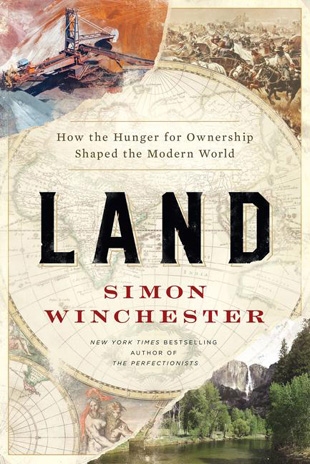Simon Winchester is a British writer and journalist. He is a repeated New York Times bestselling author (The Professor and the Madman, The Map That Changed the World, The Perfectionists) who likes to take on the challenge of roaming wide and free in subjects that convey the complexity of human choice and the dramatic fireworks of human nature.
Land is a bold, boisterous, and wide-ranging examination of the history of land ownership. The total land surface of the planet is 37 billion acres, and it has played a central role in the lives of individuals, communities, and nations.
With commendable energy and imagination Winchester begins with a bang from Anthony Trollope: "It is a comfortable feeling to know that you stand on your own ground. Land is about the only thing that can't fly away." The author does throw in the caveat that in our times, Mother Nature has demonstrated destructive powers beyond anything our ancestors ever experienced.
Winchester offers a great deal of thought-provoking material and illustrations on land. He predicts "The future is a foreign country: they will do things differently there."
He talks about the pleasures he has accrued on his 123 acres of forested land in Dutchess Country, New York. He holds in awe the beauty and variety of the landscape and the stories it has to tell. When the original British explorers witnessed the caring management of the land by American Indians, they were somewhat taken aback. They revealed little knowledge of the land and its needs and saw it "only for its potential for reward."
Although Winchester focuses on land ownership mainly in North America, he covers the global dimensions of geology, acquisition, map-making, boundaries, racism, land-grabs, and much more. He points out that indigenous peoples around the world have demonstrated foresight and wisdom in care of the land. "I love land management and looking after my land," says George Aldridge, a young Australian aboriginal firefighter. "The land is my mother, our mother, and she looks after us, and so it is only right that we look after her."
Perhaps the most telling chapter covers the practice of trespass whereby rich and powerful landowners sought to protect their property through anti-trespassing laws and the use of walls, fences, and any other means to keep themselves from what they perceived to be harm's way. Here individualism brings with it the isolation that is at the core of racism, prejudice, and violence.
Winchester hopes that the future will bring a communal use of land as a precious bond that brings people together instead of keeping them apart.
